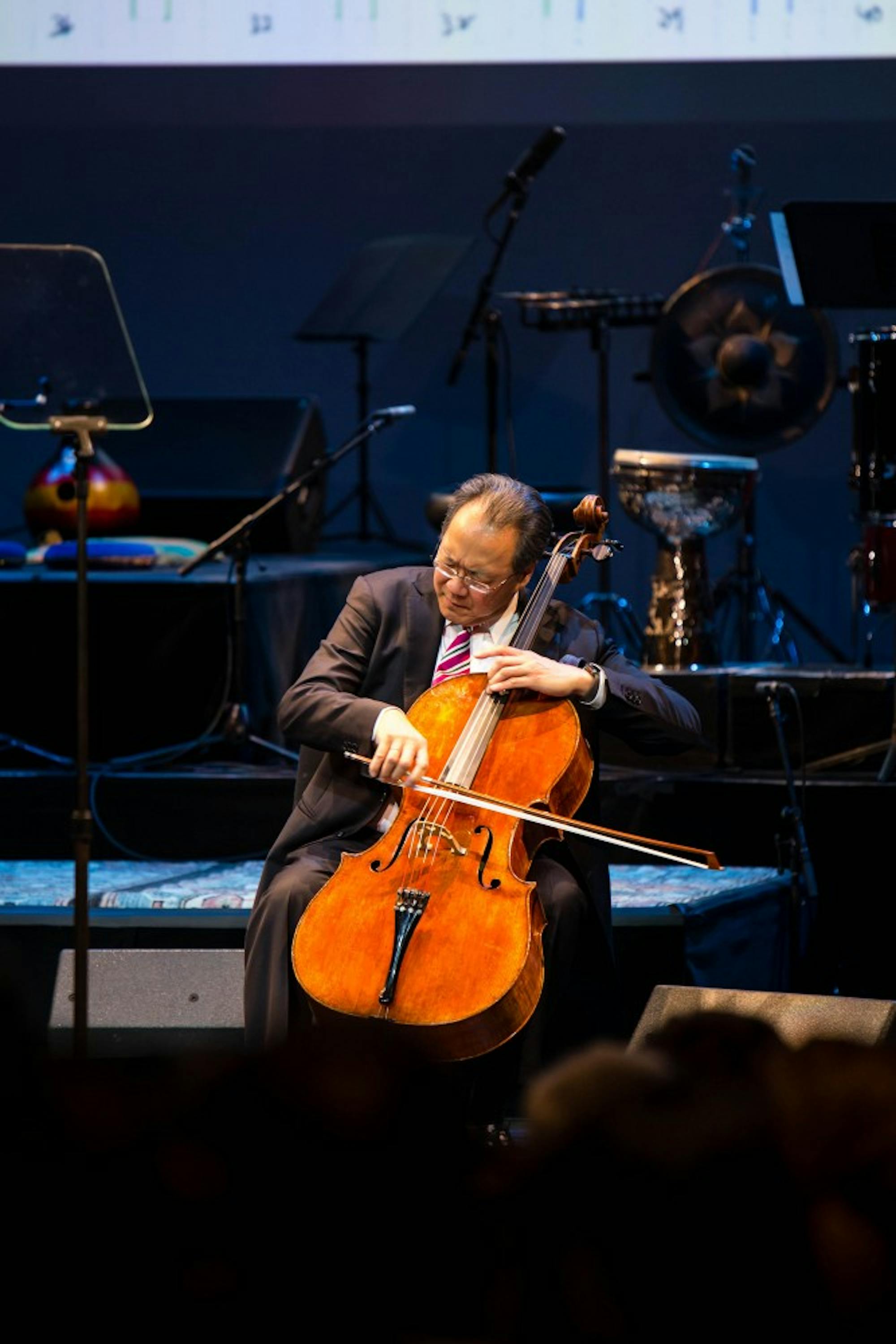The Silkroad Ensemble was at its best during the encore of its performance last night at Spaulding Auditorium. Opening with a fiery solo from pipa player Wu Man, the piece turned into a rollicking caper which used every instrument in Silkroad’s arsenal, from the thumping tabla to the breathy shakuhachi. Founder and world-renowned cellist Yo-Yo Ma, standing while he played, bobbed up and down with a smile on his face. In other words, it wasn’t your ordinary concert.
“It’s more like a party,” Wu said in an interview with The Dartmouth.
Silkroad’s performance featured Ma and included Chinese composer Jia Daqun’s “Prospect of Colored Desert II,” which was commissioned by the Hopkins Center for the Arts and saw its premiere at the concert.
Yesterday’s concert was a homecoming of sorts for the ensemble, as members said during the performance. During Silkroad’s first few years as an ensemble, they performed concerts of newly-commissioned pieces around the world, the first of which was at Dartmouth in January 2001.
With the help of Dartmouth music professor Theodore Levin, Yo-Yo Ma founded the Silkroad ensemble in 1998 with the goal of promoting cultural harmony in the midst of rapid globalization. Ma brought musicians with expertise in their respective traditions to Massachusetts, where they began collaborating in an attempt to create a new musical language.
“Music from one or another cultural origin was adapted by composers and arrangers to the unique instrumentation of the ensemble,” Levin wrote in 2016, describing the ensemble’s method. The general term “Silk Road music” has been used to reference different kinds of cross-cultural musical fusion and hybridity that are presumed to have occurred along the historic Silk Road.
From the start, yesterday’s program reflected the ensemble’s dedication to diversity, featuring pieces that represented the musical traditions of different areas of the Silk Road and beyond. The opening suite’s three parts included Arabic dance rhythms, Arab Christian Easter music and work songs of the Tuareg people of West Africa.
Silkroad’s multifacetedness was also evident in the diversity of styles and instrumentation. In the second piece, “Tsuru no Ongaeshi” (Repayment from a Crane), composer Kojiro Umezaki ’93 switched from playing shakuhachi — a Japanese end-blown flute — to narrating an adaptation of the eponymous Japanese folktale. Umezaki was inspired to compose this piece after working with students in Lame Deer on the Northern Cheyenne Indian Reservation in Montana.
The two-hour performance heavily featured the performer-as-composer, a comparatively rare figure in Western music. Three of the pieces in the program were composed by members of the ensemble. Wu’s “Night Thoughts” was inspired by a ninth-century Buddhist pipa tune, composed with the intention of returning to the pipa’s regional vernacular. Tabla player Sandeep Das’s “King Ashoka” interpreted the story of King Ashoka, who revived Buddhism after he was taken aback by the horrific violence of a long war.
In many ways, Silkroad’s work is valuable for its visionary nature. Levin, who was the ensemble’s first executive director, said Silkroad has been successful in setting a high bar for musical work that fuses cultures and traditions. But its greatest success, in Levin’s eyes, is its contribution to building community.
“The music that’s been commissioned and performed by this ensemble represents immense achievements in themselves,” Levin said. “But really what that rests on is the deep work of building community, which very much comes from Yo-Yo Ma and his core beliefs about the value of music.”
Silkroad’s welcoming, public-friendly approach makes it easy to engage with the performance. While it is often difficult to feel connected to virtuoso musicians in the highbrow world of classical music, Silkroad is talented in generating chemistry with the audience.
“I feel very fortunate to be playing alongside the other cellist in this ensemble, who shows a great deal of promise,” joked cellist Karen Ouzounian to loud laughter during the performance.
Silkroad is also admirable for its building of culture around a kind of music-making that has deeply impacted academic institutions, teacher training and inner city schools. At Dartmouth, some members of the ensemble visited music classes to talk about their work and demonstrate the stylistic elements of their musical traditions.
Ma gave a Montgomery Fellowship lecture on Wednesday which argued for using the broad concept of “culture” to build trust and understanding between communities. Though Spaulding Auditorium was at capacity and the intention behind his work is undoubtedly inspiring, his words were somewhat underwhelming. The lecture seemed to accomplish little, mostly consisting of generalizations to the tune of cultural understanding and improving the world.
The lack of depth in Ma’s lecture spoke to the need for reconsideration regarding the performance of music that includes “non-Western” elements. Cultural products that derive inspiration from societies viewed as exotic by its Western audiences require continual, sensitive discourse on the part of not only artists like Ma and Silkroad, but also listeners and fans. Though the concert and the Silkroad’s mission is inspiring, it should be taken as “a beginning for new listeners, not an end,” as New York Times music critic John Rockwell wrote in 2002. Rockwell rightly raises questions regarding “the culinary sampling aspect of the offerings, and the production values that exacerbate the sense of being an imperialist wanderer in a field of gorgeous but mystifying blossoms.”
Silkroad’s work might not be imperialist, but to progress efficiently and ethically in the world of cross-cultural music making, it would only be responsible to continue discussing and working out such concerns.
In any case, the work of Silkroad and similar ensembles like Kronos Quartet and Brooklyn Rider is undoubtedly essential, and is done with the highest quality of musicianship. Silkroad also continues to move forward in its artistic mission — last fall, the group announced a three-part vision that involves increasing diversity and inclusion for all people involved in the project, a series of U.S.-based residencies, and a new series of commissions.




